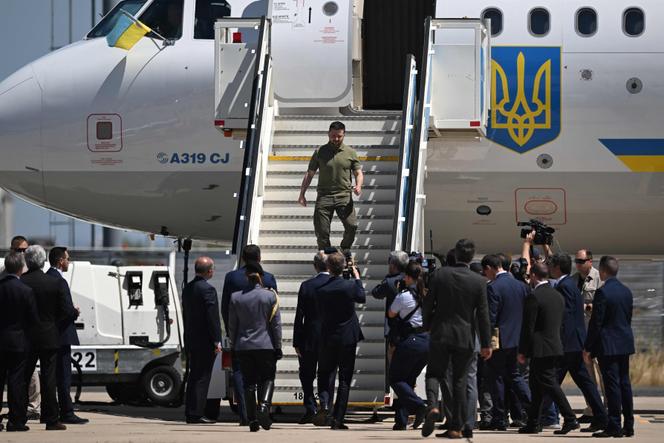
The last couple of hundred surviving D-Day veterans and the first of the Ukrainian resistance fighters. Volodymyr Zelensky is expected to be very much in evidence at the ceremonies marking the 80th anniversary of the Allied landings on the Normandy coast in 1944. While Russia has been making progress in Ukraine, the Ukrainian president is expected, barring any serious setbacks, to be present on Thursday, June 6 at Omaha Beach, alongside French President Emmanuel Macron, in the company of some 20 heads of state and government. US President Joe Biden will also be there, as will German Chancellor Olaf Scholz, British Prime Minister Rishi Sunak and Canadian Prime Minister Justin Trudeau.
Before welcoming his guests, Macron started the commemorations in Brittany on Wednesday, at Plumelec, where, on the night of June 5-6, 1944, some 20 French paratroopers were dropped to join local resistance fighters in preventing the Germans from reaching Normandy. The president will close the events on Friday morning in the Normandy city of Bayeux, in the footsteps of General Charles de Gaulle, who made a famous speech there in 1946. The ceremonies organized over three days in tribute to the liberation of France, from bombarded towns (Saint-Lô, Caen) to military cemeteries (Ver-sur-Mer, Colleville-sur-Mer), cannot overshadow the deadly conflict that is once again tearing the continent apart and jeopardizing its security, far beyond the Ukrainian battlefields.
Display of cohesion
Unlike the 70th anniversary festivities, Russia has not been invited, precisely because of the protracted war in Ukraine. In 2014, Vladimir Putin had been welcomed in France a few months after illegally annexing Ukraine’s Crimea peninsula, while his country was subject to the first Western sanctions.
François Hollande and Angela Merkel had made the Russian leader’s visit conditional on an icy meeting with Ukrainian President Petro Poroshenko on June 6. Putin had not yet officially recognized the man who had just been elected in the wake of the pro-European Maidan revolution in Kyiv, and the fall of the pro-Russian president, Viktor Yanukovych. Donbas separatists, aided by Russian auxiliaries, were already fighting in eastern Ukraine. The Normandy Format, established to attempt an unprecedented French-German mediation between Moscow and Kyiv, and the Minsk agreements, signed in 2015, were not enough to prevent the large-scale invasion of February 24, 2022.
Now, after more than two years of fighting, the peace celebrations organized on the beaches of Normandy are being largely overshadowed by the stalemate of the war on Europe’s doorstep. It is now more a question of Western allies demonstrating their cohesion, and continuing their support for Ukraine.
You have 66.2% of this article left to read. The rest is for subscribers only.